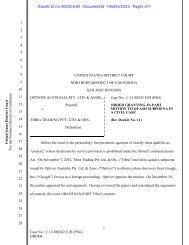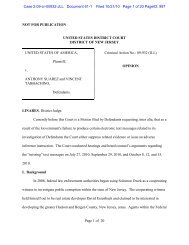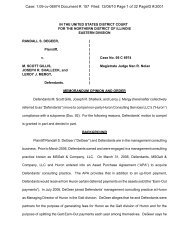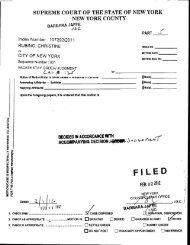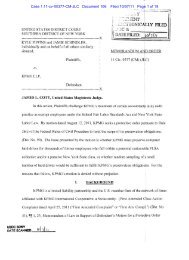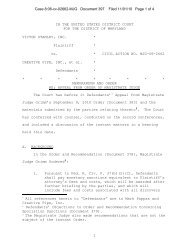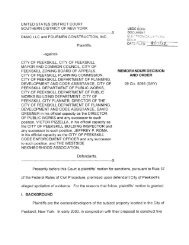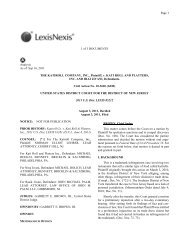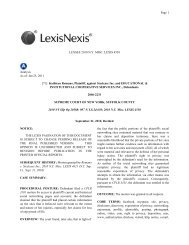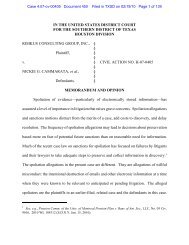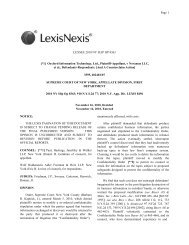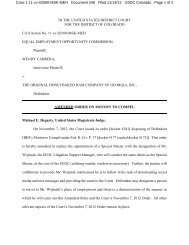SANCTIONS FOR E-DISCOVERY VIOLATIONS: BY THE NUMBERS
SANCTIONS FOR E-DISCOVERY VIOLATIONS: BY THE NUMBERS
SANCTIONS FOR E-DISCOVERY VIOLATIONS: BY THE NUMBERS
You also want an ePaper? Increase the reach of your titles
YUMPU automatically turns print PDFs into web optimized ePapers that Google loves.
796 DUKE LAW JOURNAL [Vol. 60:789<br />
II. E-<strong>DISCOVERY</strong> SANCTION CASES ARE A DIVERSE DOCKET<br />
Sanctions relating to e-discovery violations have reached courts<br />
everywhere, have appeared in all types of cases, have been awarded<br />
based on varying authority, and have been granted to defendants and<br />
plaintiffs asymmetrically.<br />
A. E-Discovery Sanction Motions Are Before All Courts<br />
Our research indicates that 183 district court judges and 111<br />
magistrate judges from seventy-five federal districts in forty-four<br />
states, 26 as well as the Virgin Islands, 27 the District of Columbia, 28 and<br />
Puerto Rico, 29<br />
have issued written opinions regarding sanctions<br />
involving e-discovery. All eleven of the federal appellate circuit<br />
courts, 30 as well as the Federal 31 and D.C. Circuits, 32 have issued<br />
26. District courts in six states, Alaska, New Mexico, North Dakota, Vermont, West<br />
Virginia, and Wyoming, have not issued written opinions regarding sanctions for e-discovery<br />
violations.<br />
27. See Canton v. Kmart Corp., No. 1:05-cv-143, 2009 WL 2058908, at *1–3 (D.V.I. July 13,<br />
2009) (granting the plaintiff’s motion for a spoliation-of-evidence jury instruction to sanction the<br />
defendant for the failure to preserve videotape and other evidence); Nieves v. Kmart Corp., No.<br />
2005-CV-0024, 2009 WL 1605623, at *1–2 (D.V.I. June 8, 2009) (denying the plaintiff’s motion<br />
for a spoliation-of-video-evidence instruction); Dowling v. United States, No. 2000-CV-0049,<br />
2008 WL 4534174, at *2 (D.V.I. Oct. 6, 2008) (denying the plaintiff’s motion for sanctions but<br />
granting a spoliation-of-evidence instruction due to the defendant’s failure to preserve<br />
audiotape evidence).<br />
28. Covad Commc’ns Co. v. Revonet, Inc., 260 F.R.D. 5, 9 (D.D.C. 2009) (staying the<br />
plaintiff’s motion for sanctions concerning the defendant’s failure to produce ESI documents in<br />
the proper electronic format).<br />
29. Century ML-Cable Corp. v. Carrillo, 43 F. Supp. 2d 176, 185 (D.P.R. 1998) (sanctioning<br />
the defendant for destroying a laptop and awarding default judgment in favor of the plaintiffs).<br />
30. O’Brien v. Ed Donnelly Enters., 575 F.3d 567, 587–88 (6th Cir. 2009) (reversing the<br />
district court’s denial of an adverse-inference-instruction sanction for the spoliation of reports<br />
stored on a computer hard drive and remanding for consideration of whether appellees knew, or<br />
should have known, that the destroyed information may have been relevant to future litigation);<br />
Ibarra v. Baker, 338 F. App’x 457, 470 (5th Cir. 2009) (reversing the district court’s sanctions<br />
against the defendant’s attorney for the client’s deletion of emails because there was no finding<br />
of bad faith evidenced by an intent to destroy adverse information); Brookhaven Typesetting<br />
Servs., Inc. v. Adobe Sys., Inc., 332 F. App’x 387, 389 (9th Cir. 2009) (affirming the district<br />
court’s refusal to grant terminating sanctions for the destruction of electronic source code);<br />
Trask-Morton v. Motel 6 Operating L.P., 534 F.3d 672, 680 (7th Cir. 2008) (holding that a<br />
showing of bad faith is a prerequisite to imposing sanctions for the destruction of evidence);<br />
Buckley v. Mukasey, 538 F.3d 306, 323 (4th Cir. 2008) (instructing the district court that a<br />
finding of “bad faith” is not essential for an adverse-inference instruction for prelitigation<br />
spoliation and suggesting that “intentional,” “willful,” or “deliberate” conduct may be sufficient<br />
(quoting Vodusek v. Bayliner Marine Corp., 71 F.3d 148, 156 (4th Cir. 1995) (internal quotation<br />
marks omitted))); Procter & Gamble Co. v. Haugen, 427 F.3d 727, 738–40 (10th Cir. 2005)<br />
(reversing the district court’s order of dismissal for failure to preserve electronic data when the



